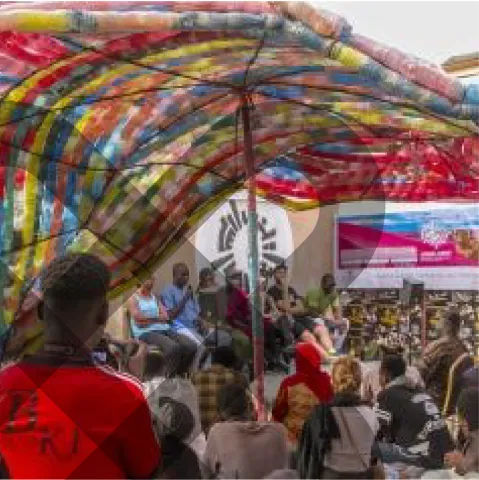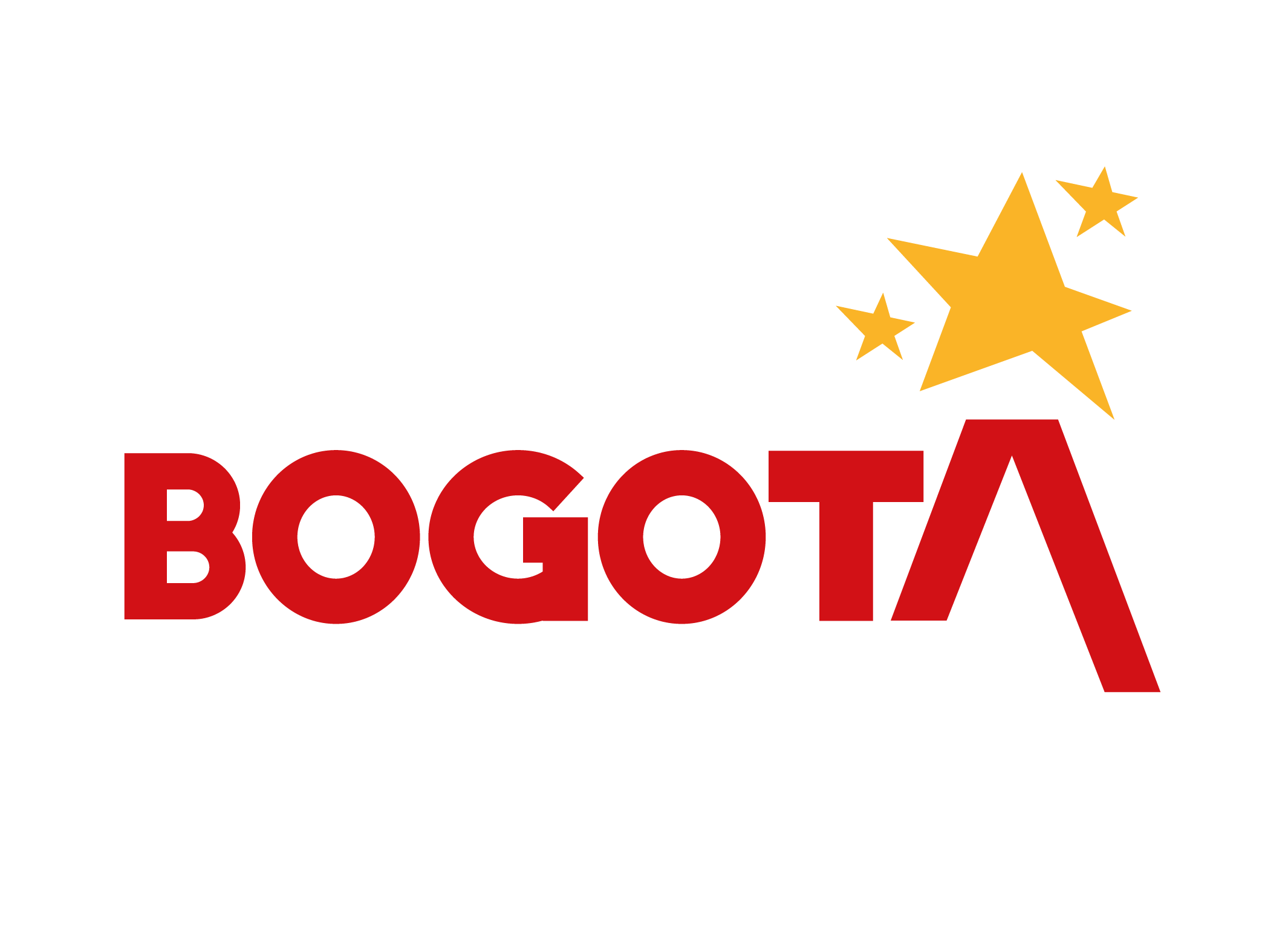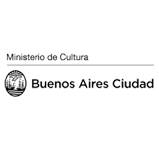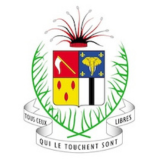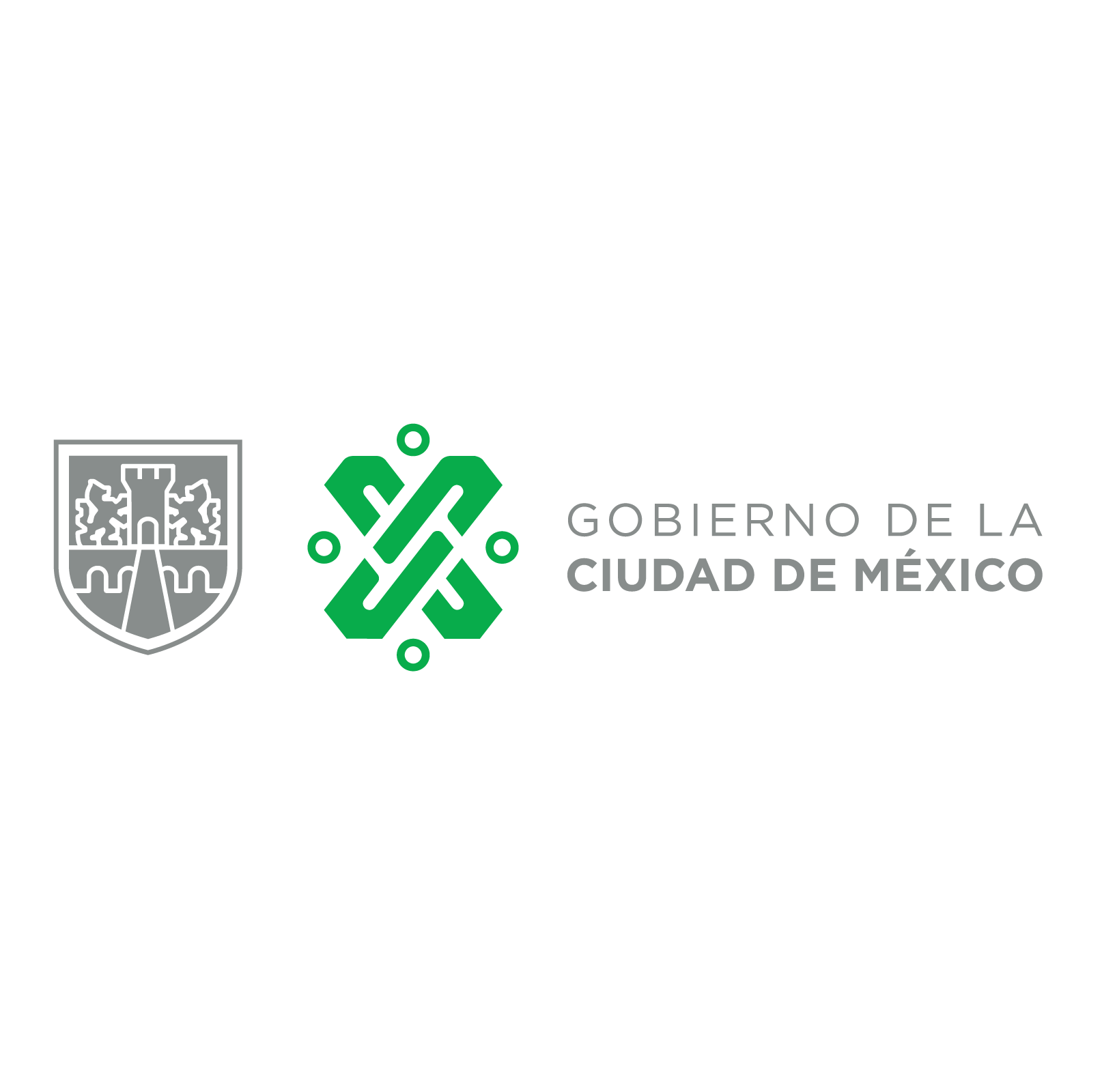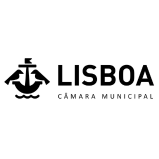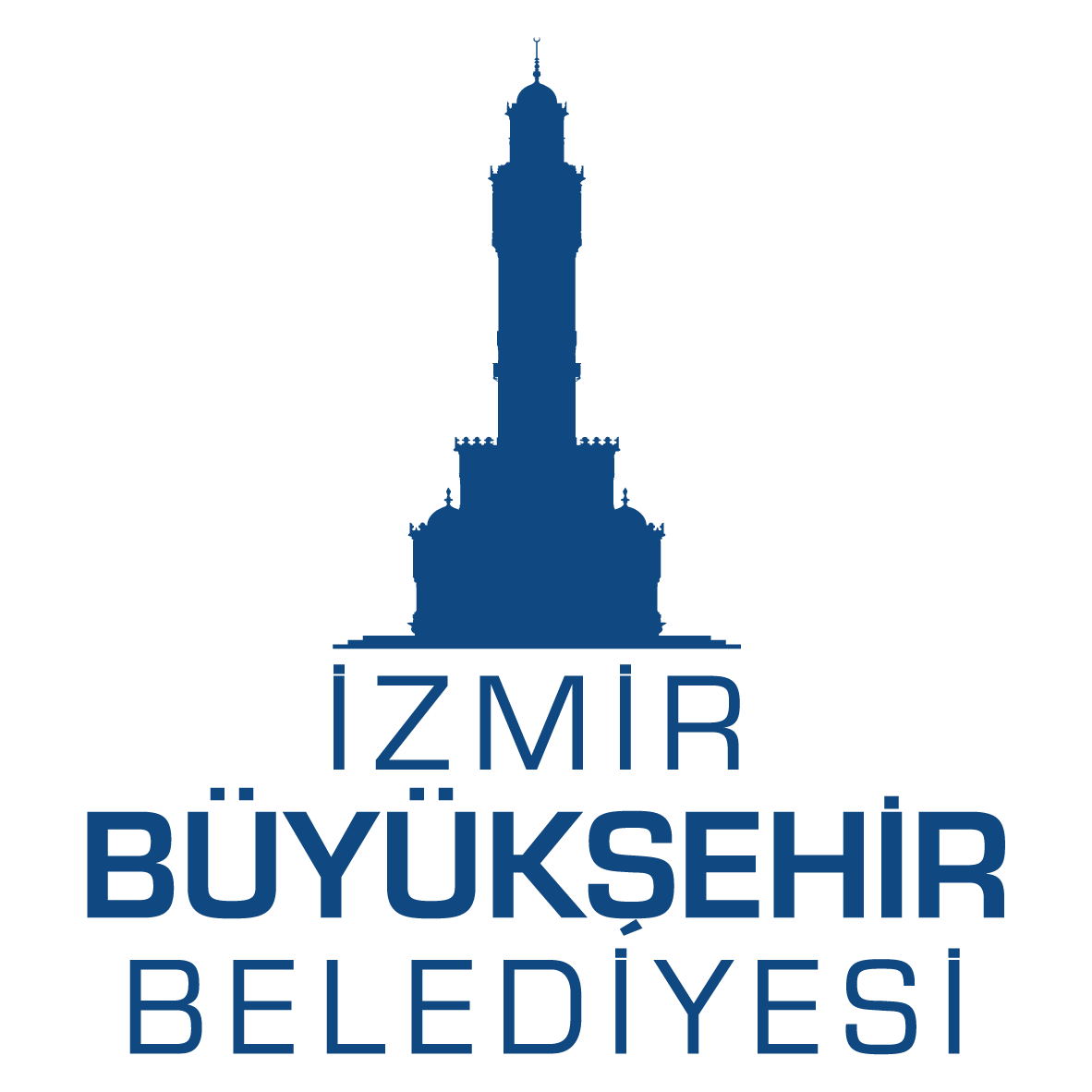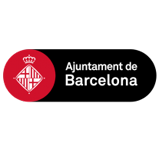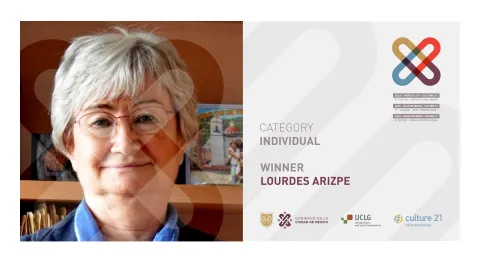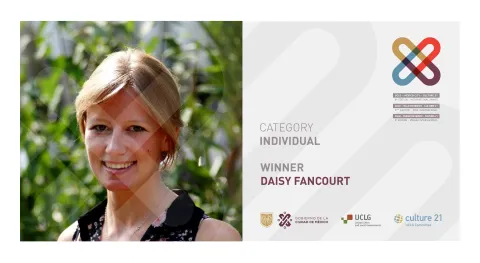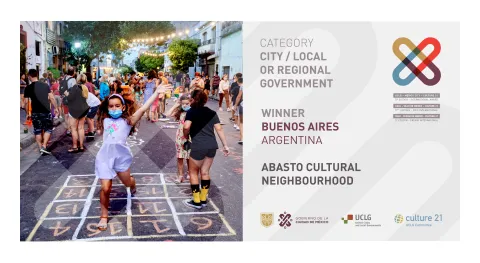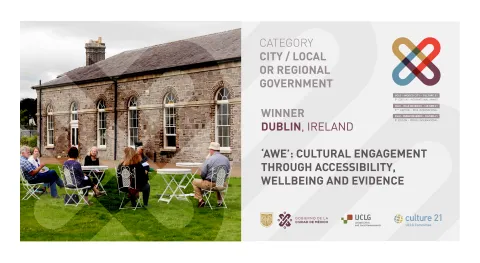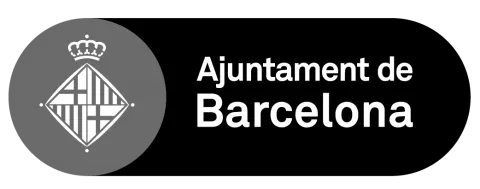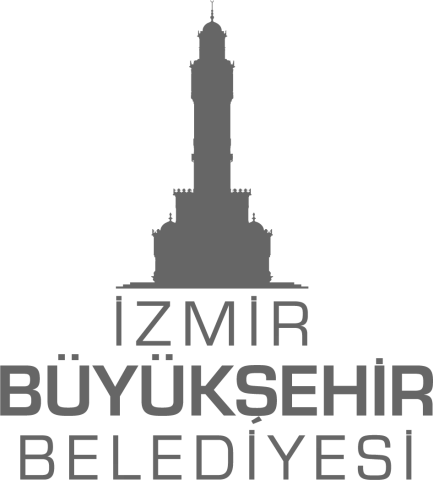5th edition 2021-2022

Find here the Rules of the 5th edition of the International Award UCLG - Mexico City - Culture 21, which recognises cities and individuals who have excelled in the promotion of cultural rights in the context of the Covid-19 crisis and post-pandemic recovery, and/or that have promoted culture as an important part of the caring system.
Applications and nominations were received between 15th February and 22nd April 2022.
The best actions were announced in May 2022, under two labels: Innovative Sparks and Planning for Care.
The International Jury held its final meeting on 9 June 2022. The final results were shared during the Executive Bureau of UCLG in Seville on 15 June 2022.
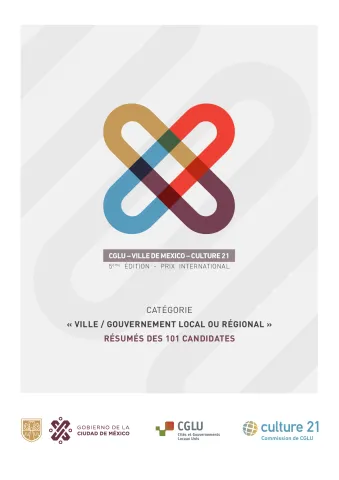
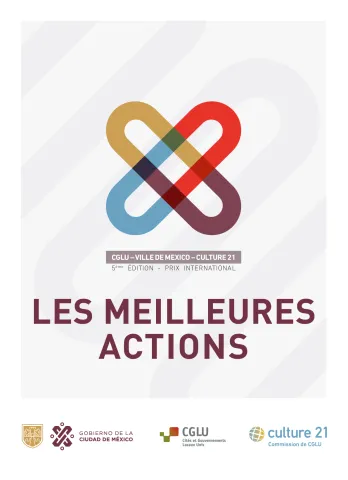
In 2022-2023, the 5th edition of the International Award UCLG - Mexico City - Culture 21 recognises cities and personalities who have excelled in the promotion of cultural rights in the context of the Covid-19 crisis and post-pandemic recovery, and/or that have promoted culture as an important part of the caring system.
Candidacies from cities and local or regional governments and nominations from individuals have been received between 15 February and 22nd April 2022.
The Best Actions were announced in May 2022, under two labels: Innovative Sparks and Planning for Care.
The International Jury held its final meeting on 9 June 2022. The final results were shared during the Executive Bureau of UCLG in Seville on 15 June 2022.
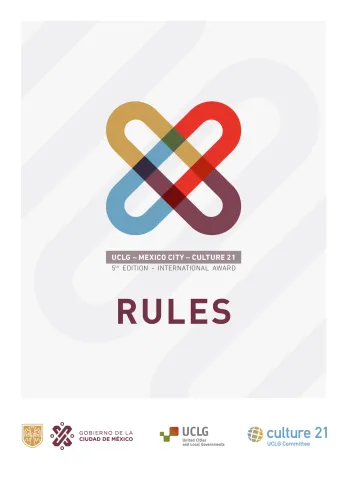
The Jury of the 5th edition of the International Award UCLG - Mexico City - Culture 21 was made up of the following five members, all of whom are prestigious international experts with impeccable trajectories in the cultural field: Catherine Cullen (president of the Jury); Serhan Ada; Diana Alarcón González; Claudia Curiel de Icaza and Francisco d'Almeida.
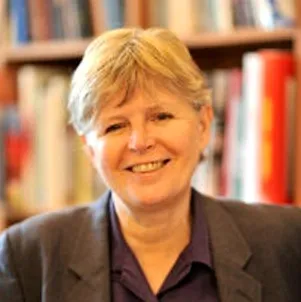
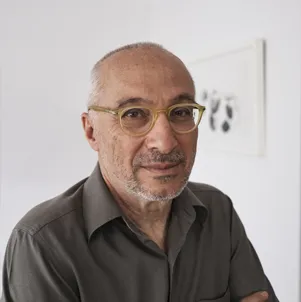
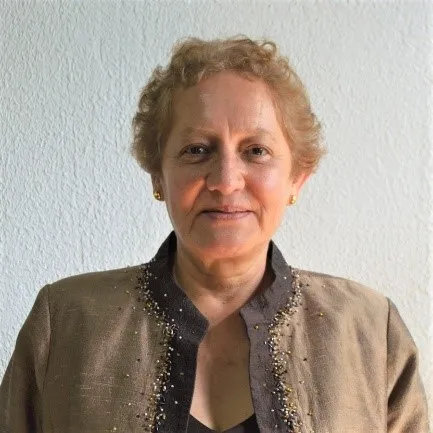
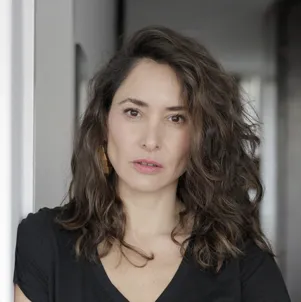
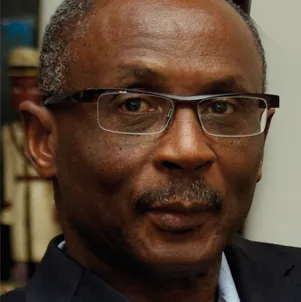
See below the document of presentation of the International Jury of the 5th edition of the Award.
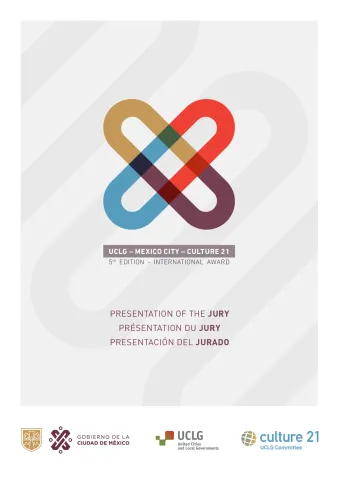
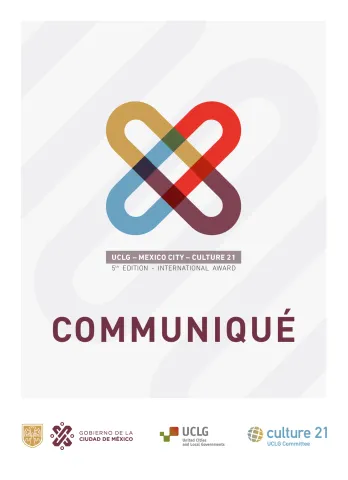
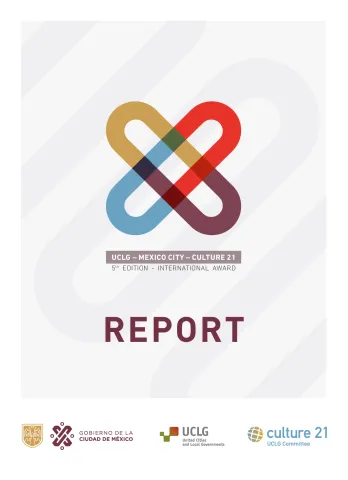
Category “City / Local or Regional Government”
The process is divided into two phases:
PHASE 1. The Jury analysed the applications received before 22nd April 2022.
In May 2022, the list of the Best Actions was announced. The finalist candidacies were invited to complete the Application Form in full, and will be automatically recognised as good practices with the labels “Innovative Sparks” or "Planning for Care".
PHASE 2. The finalists delivered their candidacies (that is, fully completed: with all fields of the Application Form) before 27th May 2022. The Jury is currently analysing applications.
The winner(s) will be announced in June 2022 at the UCLG Executive Bureau.
All the details of the process are specified in the Rules of the 5th edition of the Award.
Nominate in the category “Individuals”
The deadline for nominations is 27th May 2022.
Spontaneous nominations for the category “Individual” shall be submitted only to the e-mail address cultureaward@uclg.org. The spontaneous nomination shall consist of one document, according to the proposed form. Once a nomination has been received, the organisers of the Award will send a message by email acknowledging the receipt.
Nominations will not be published.
All the details of the process are specified in the Rules of the 5th edition of the Award.
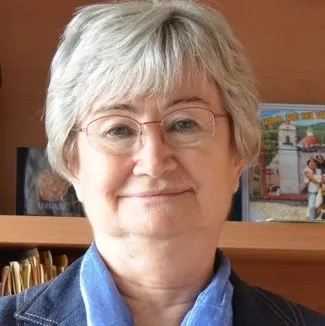
DR. LOURDES ARIZPE
Dr Lourdes Arizpe was appointed Secretary General and member of the United Nations Commission on Culture and Development at the same time that she was managing cultural projects in many countries of the world as UNESCO's Assistant Director General for Culture. As a consultant for UNESCO, she participated to the Convention for the Safeguarding of the Intangible Cultural Heritage as well as to the Convention on the Diversity of Cultural Expressions. Elected President of the International Social Science Council (ISSC), she was Chairman of the Governing Board of the UNRISD: United Nations Centre for Social Development Studies in Geneva. She also served on the Governing Board of the Bibliotheca Alexandrina.
Dr. Arizpe holds a PhD in social anthropology from the London School of Economics, and was Director of the Institute of Anthropological Research. She also was researcher at the Regional Centre for Multi-disciplinary Research at the National Autonomous University of Mexico, as well as Secretary of the Mexican Academy of Science. She also directed the National Museum of Popular Cultures of Mexico. She has received awards and distinctions from Mexican, European and Asian universities. Among her most recent publications: “Cultura, Transacciones Internacionales y el Antropoceno” (CRIM-UNAM, M. A. Porrúa, 2019) - also published in English by Springer-MacMillan, “Renovación y futuro del patrimonio cultural inmaterial en México” (CRIM-UNAM, 2017) and “Lourdes Arizpe: a Pioneer in Mexican Anthropology” (Springer Verlag, 2014).
See the biography of Dr. Lourdes Arizpe.
See the article elaborated by Dr. Lourdes Arizpe and her teams.
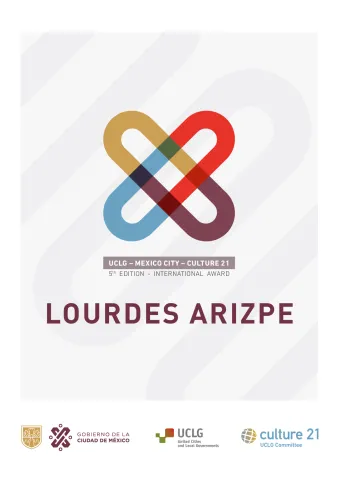
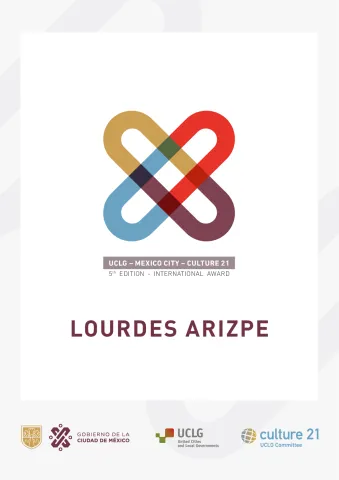
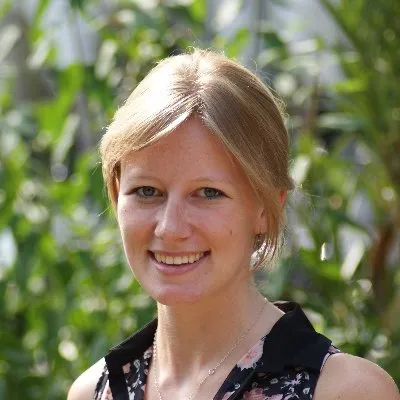
Dr. DAISY FANCOURT
Daisy Fancourt. The work of Dr Daisy Fancourt has decisively contributed to prove the benefits of cultural activities for people’s health. She is Associate Professor of Psychobiology & Epidemiology and Head of the Social Biobehavioural Research Group at University College London. She studied at Oxford University and King’s College London before completing her PhD in psychoneuroimmunology at University College London. Her research focuses on the effects of social factors on health, including social deficits (e.g. loneliness and social isolation) and sociocultural assets (e.g. community engagement, arts & cultural activities, and social prescribing). Dr Daisy Fancourt is also the Director of the World Health Organisation Collaborating Centre on Arts and Health (www.artshealthcc.org) as well as a member of the WHO Technical Advisory Group on cultural and behavioural insights on health.
The report “What is the evidence on the role of the arts in improving health and well-being? A scoping review”, based on the review of over 3000 studies was worldwide disseminated and acclaimed. The report and subsequent theoretical work from Dr Fancourt has shown that arts and culture combine many different components (‘active ingredients’) that are beneficial to health, for example involving the imagination, sensory activation, cognitive stimulation and social interaction. In further work published in the Lancet Psychiatry, Dr Fancourt has then shown that these components can prompt over 600 different psychological, physiological, social and behavioural mechanisms which are linked-in with the prevention, management and treatment of a range of different health conditions. Through Dr Fancourt’s publications, the beneficial impact of cultural activities has a renewed scientific evidence base. The promoting of artistic and cultural engagement at the individual, local and national levels is becoming essential in public policies for sustainable development.
See the biography of Dr. Daisy Fancourt.
See the article elaborated by Dr. Daisy Fancourt and her teams.
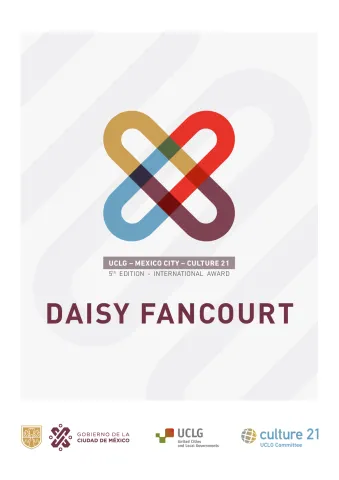
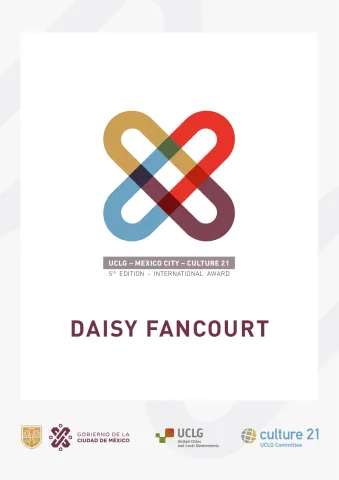
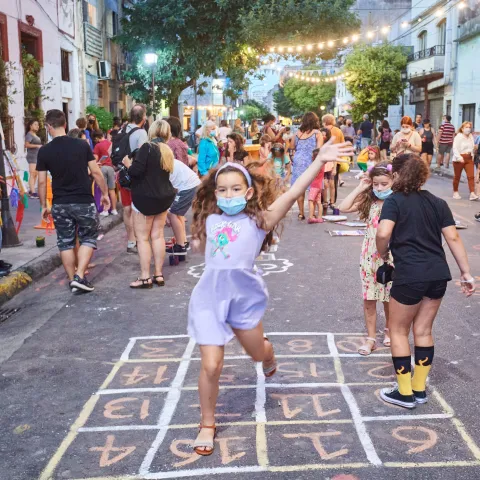
BUENOS AIRES (ARGENTINA)
The project “Abasto cultural neighbourhood: economic boost and urban regeneration” is promoted by the Ministry of Culture of the City of Buenos Aires since 2019. It is an urban regeneration project based on the transformation of public space, drawing on a model of participatory governance of culture that promotes the collective creation of identity and social integration, enhancing the activity of the independent cultural spaces that distinguish the Abasto neighbourhood. The project has invested in infrastructure, leading to improvements in the public space such as increasing pedestrian accessibility and enhancing the quality of life of neighbours. It has also promoted the cocreation with the communities, allowing the implementation of a participatory governance model in which public space is understood as a stage and platform for cultural activities, and it has relied on the value of local cultural industries, boosting the reflection and shared construction of the tangible and intangible identity features of the communities as driving forces for social integration. Impacts include a better articulation of the cultural supply of the neighbourhood and its relationship with cultural space, the reduction of inequalities within the community and the enhancement of the diversity of local cultural expressions.
See the summary of Buenos Aires's project "Abasto Cultural neighbourhood: Economic boost and urban regeneration".
See the article on Buenos Aires's "Abasto Cultural neighbourhood: Economic boost and urban regeneration" project.
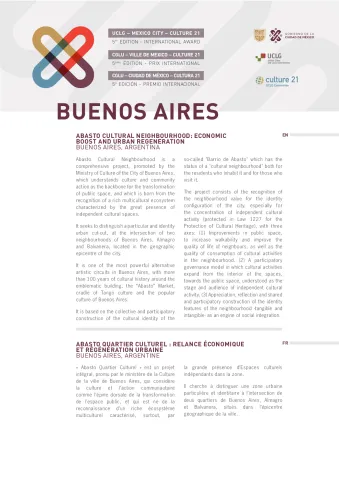
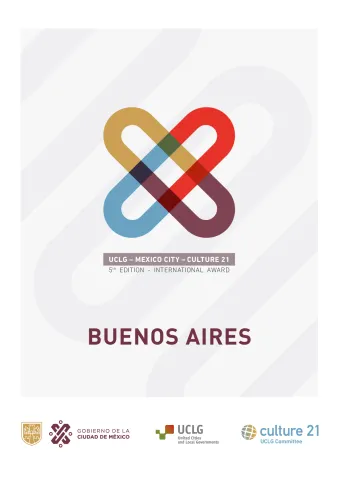
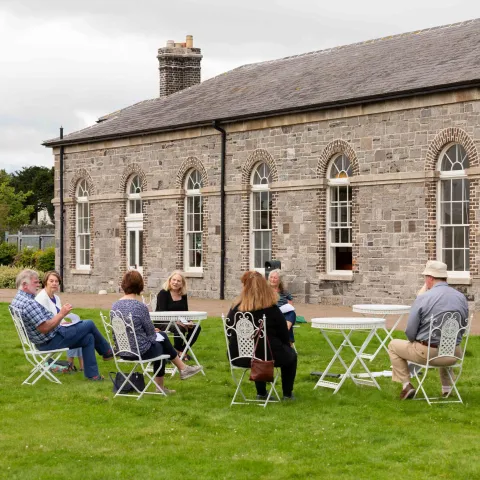
DUBLIN (IRELAND)
"'AWE' - Cultural Engagement through Accessibility, Wellbeing and Evidence" was initiated by Dublin City Council Culture Company in April 2020 as a sustainable response to the challenges of the COVID-19 pandemic. 'AWE' was envisioned as a strategy to protect the cultural rights of Dublin's citizens, and to actively engage with them and respond culturally to their needs, through 3 main strands: (a) Accessibility, (b) Wellbeing, (c) Evidence. The Culture Company, established in 2018 with the mission to engage with people and communities through conversation and culture, increasing cultural participation and practice throughout the city's neighbourhood, continued their engagement work with community groups, youth leaders, artists, partners from the local authority, residential care homes, businesses and national cultural institutions. Through listening, responsive actions to improve accessibility, inclusion and create more ways into culture during the pandemic were created. 'AWE' has actively demonstrated the success, transferability and adaptability of an original methodology that not only ensured the cultural rights of citizens during the pandemic and beyond, but also undertook extensive research that could be considered as a benchmark for other cities.
See the summary of Dublin's initiative "'AWE' - Cultural engagement through accessibilitym wellbeing and evidence".
See the article on Dublin's "AWE: Cultural engagement through accessibility, wellbeing and evidence" initiative.
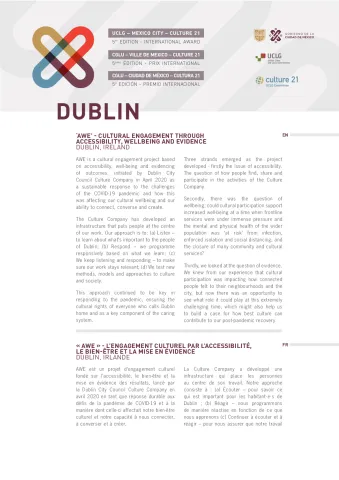
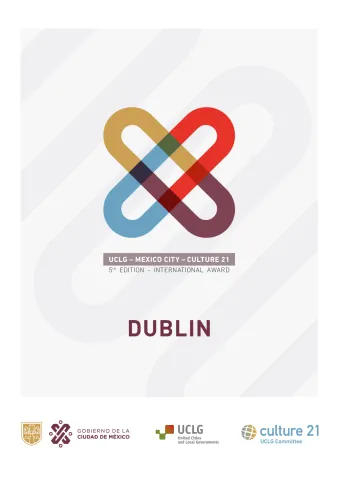
Bandung (West Java, Indonesia), for the project "Hutan Menyala (Glowing Forest)", which has set the forest Hutan Mayala, one of the greater cultural and natural assets of Bandung, as an innovative post-pandemic destination in the form of an audio-visual experience. The project allows the protection and promotion of the forest, mixing advanced digital technology and traditional cultural elements.
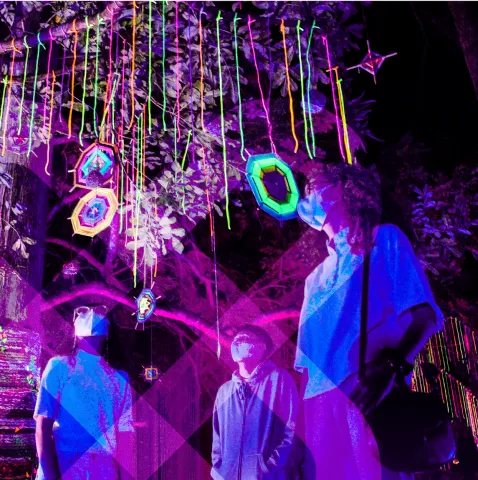
Busan (Republic of Korea), for the project "Busan Galmaetgil, a cultural value promotion project manifested through urban trails". This project enhances public health and cultural enjoyment through convenient and clean urban trails, showcasing cultural content, local traditions and history as well as its relationship with nature, and offering activities to promote sustainable tourism and respond to the climate emergency, among others.
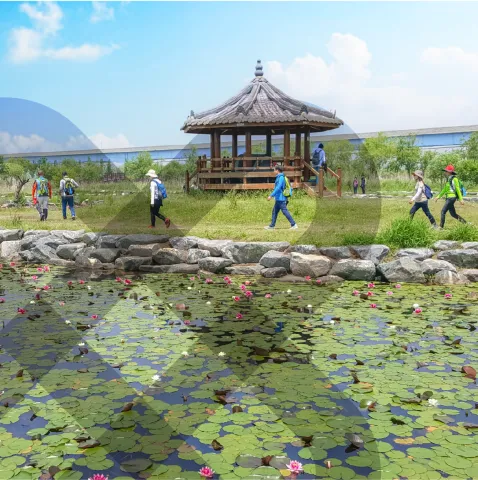
Izmir (Turkey), for the project "İzmir's project on boosting up culture as a key for resilience and development". This project shows that political will can bring culture to the forefront in policies, plans and practices. Through a comprehensive and innovative policy, “Crisis Municipalism”, Izmir offers new models for public service delivery with culture as one of its main pillars, providing access to culture, encouraging participation and triggering solidarity.
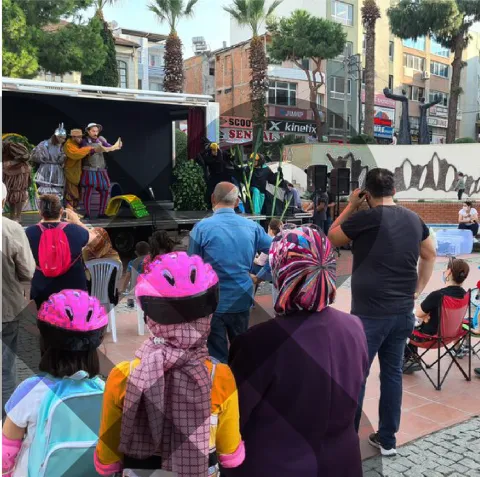
Jinju (Republic of Korea), for the project "The Art Delivery Project". Since 2019, this project has helped narrowing the gap in the enjoyment of cultural rights between urban and rural areas and enhancing participation of the underprivileged, marrying the traditional folk arts of Jinju with modern arts, and engaging local cultural actors in the framework of events such as the Jinju World Folk Arts Biennale.
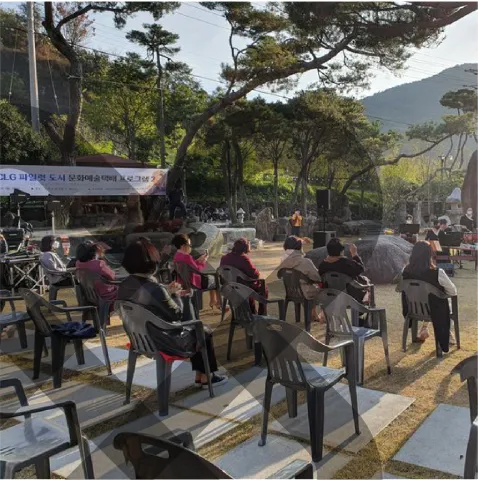
Ouagadougou (Burkina Faso), for the project "Cultural development of Greater Ouaga, city of well-being and social cohesion". This project has contributed significantly to the balanced cultural development of Greater Ouaga and the well-being of its inhabitants, mainly made up of young people under 25 (60%), reducing the geographical inequalities of access to art and culture by providing adequate cultural infrastructure and educational activities for all.
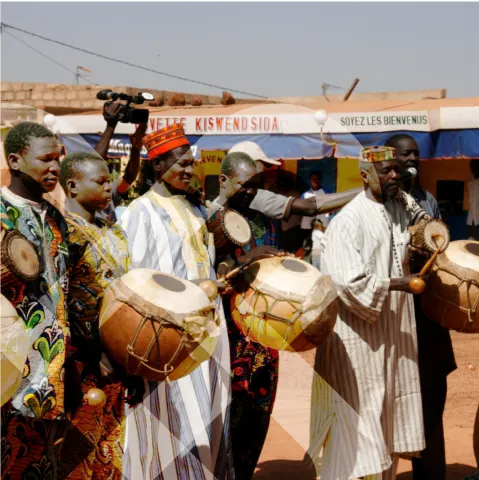
Tevragh Zeina (Nouakchott, Mauritania), for the project "Heya Nouakchott: Tevragh Zeina, creative city". This project has enabled the construction of a solid cultural policy for the city, centred on sustainable development. HEYA Nouakchott has also contributed to the professionalisation of the cultural sector and the improvement of working conditions for cultural actors and artists during the pandemic and beyond.
